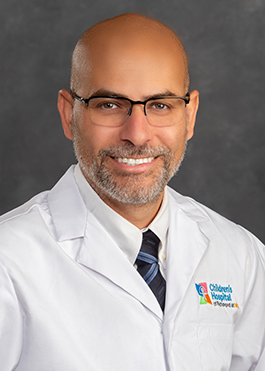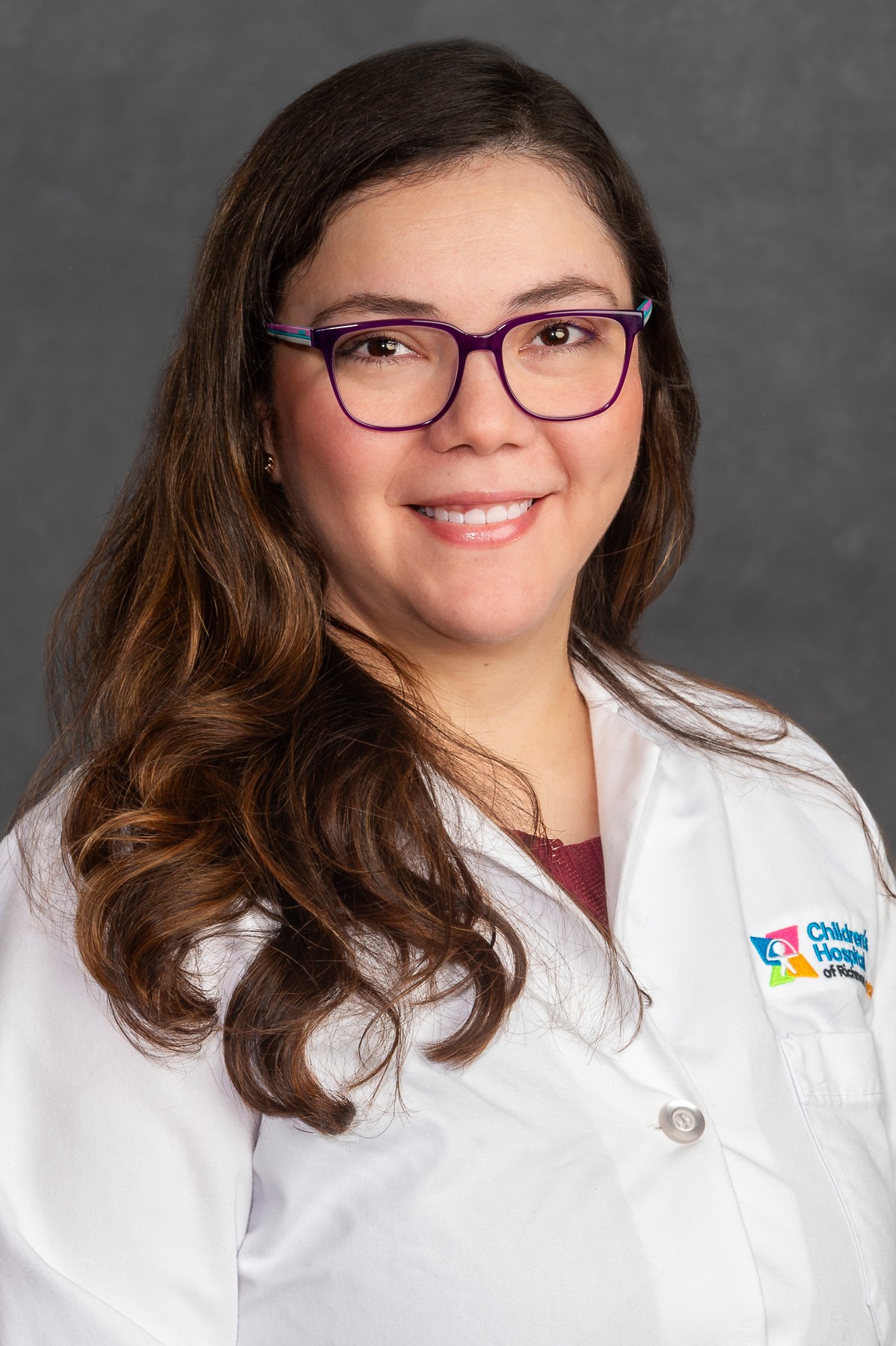Fellowships
Neonatal fellowship program
Preparing the next generation of neonatologists for careers as scientists, teachers and clinicians
The Neonatal-Perinatal Medicine Fellowship at Virginia Commonwealth University School of Medicine is a three-year, ACGME-accredited program committed to providing the highest level of comprehensive care and innovative research for the high-risk infants and families we serve, regardless of race, religion, gender or socioeconomic status. Our curriculum provides exceptional training opportunities and experience in the highest level of neonatal care critical care management, with important experiences in basic, translational and quality/safety research and academic teaching. Not all of our graduates will choose to pursue full-time academic careers, but all are uniformly prepared by the training experiences, tools and teaching they received for whatever professional path they choose.
We are proud of our graduates and the fact that over the past 15 years they have all not only passed Neonatal Boards on the first attempt but have gone on to leadership positions in clinical care, research and education reflecting both who they are and the training they received. Learn more about the Division of Neonatal Medicine in the Department of Pediatrics.
A message from the program director
 As neonatologists, we are deeply committed to advancing the health and outcomes of newborns, especially those requiring intensive care. A vital part of this mission is training the next generation of neonatal-perinatal specialists. Our university-based, academic fellowship program offers a rich clinical and scholarly environment focused on evidence-based care, health equity, family-centered advocacy and multidisciplinary collaboration.
As neonatologists, we are deeply committed to advancing the health and outcomes of newborns, especially those requiring intensive care. A vital part of this mission is training the next generation of neonatal-perinatal specialists. Our university-based, academic fellowship program offers a rich clinical and scholarly environment focused on evidence-based care, health equity, family-centered advocacy and multidisciplinary collaboration.
During your fellowship, you will work closely with experienced faculty, fellows, and interdisciplinary teams in high-acuity settings to develop expertise in neonatal intensive care, perinatal consultation, and research. You will gain hands-on experience managing complex cases, leading care teams, teaching residents and students, and contributing to academic scholarship.
Upon completion of the program, you will be well equipped to pursue a career in academic neonatology, clinical neonatology, clinical leadership, or research, and to make a lasting impact in the field of neonatal-perinatal medicine.
We are honored to be part of your professional journey. Please don’t hesitate to reach out with any questions.
Nayef Chahin, MD, MEd
Associate professor of pediatrics
Program opportunities
Be part of a dedicated team providing exceptional care to our most critically ill infants. Leveraging our specialized expertise, collaborative pediatric subspecialty approach, and the latest advancements in technology within a state-of-the-art Level IV NICU, we are committed to offering every patient the best possible opportunity for a healthy and fulfilling life.
The Neonatal-Perinatal Medicine Fellowship at Virginia Commonwealth University School of Medicine is a three-year, ACGME-accredited program that provides exceptional training opportunities and experience in clinical care, research and teaching. Fellows receive training from world-class experts in an unmatched level 4 Regional Perinatal Center clinical care environment with mentored individualized teaching including in unit ECMO, air and ground transport of the critically ill neonate, point of care ultrasound (POCUS) training and neurodevelopmental follow-up coupled with extensive research opportunities.
As one of two fellowship training programs in Virginia, our Neonatal-Perinatal Training Program offers an extensive range of patient conditions for fellow education within the level IV Regional Perinatal Center as well as comprehensive training in neurodevelopmental follow-up care that prepares future neonatologists for any clinical situation. Upon completion of the program, fellows are ready to excel in the highest level NICUs, caring for the most critically ill infants and their families to optimize future patient care.
The level IV Neonatal Regional Perinatal Center is located in VCU Medical Center's Critical Care Hospital and is a core component of Children's Hospital of Richmond at VCU. Children's Hospital of Richmond at VCU is Virginia's only comprehensive children's hospital and academic health system with complete individual infant single room accommodations for infants and parents. This comprehensive care includes same level linked labor and delivery service with robust obstetrical maternal fetal medicine program, an onsite NICU operating-procedure room, neonatal ECMO Gold ELSO designated facility, neonatal comprehensive Hypothermia Program with continuous EEG monitoring, ground and air transport, as well as a regional Multidisciplinary Neonatal Neurodevelopmental Follow-up Program to advance the best outcome for infants.
The range of research possibilities is almost limitless given integration with CHoR's Child Health Research Institute. Fellows are supported by individual Faculty Scholarship oversight teams with the ability to learn from neonatal faculty, and faculty from other pediatric divisions, or university faculty. In prior years, fellows have performed research under the mentorship of investigators from the School of Medicine and the Department of Neurosurgery, Cardiology, Pulmonary Medicine and the Center for Biological Complexity. Opportunities exist to support fellows interested in pursuing an advanced degree in public health or in clinical research.
The training curriculum in Neonatal Medicine follows a graduated independence process. At the beginning of the program, fellows attend an introductory course in clinical research design, research ethics, working with subjects protection committees as well as introductory biostatistics. Working with the program training director and faculty mentors, fellows identify an area of research that meets the fellow's interest. By the middle of the first year, background reading is done, with research design developed and approved by the appropriate regulatory body.
With about twelve months protected time for research, in the second year fellows perform the needed steps to obtain successful data collection and integration with experience in data analysis. Fellows learn to prepare their studies for Pediatric Society abstract presentation and are expected to submit to (and present at) regional and national meetings.
In the third year, there is sufficient time and support to complete data analysis and manuscript preparation and most fellows undertake a second or even third project, either as a natural extension of their primary project or, for example, in clinical research if their primary efforts have been in more basic research or in Quality Improvement. Applying for grants is taught and encouraged. Most fellows have completed at least two projects before graduation.
Examples of fellow publications
Chahin N, Yitayew MS, Richards A, Forsthoffer B, Xu J, Hendricks-Muñoz KD. Ascorbic Acid and the Premature Infant. Nutrients. 2022 May 24;14(11):2189. doi: 10.3390/nu14112189. PMID: 35683989; PMCID: PMC9183051.
Hazboun RG, Darwish N, Rotyliano-Sykes G, Chahin N, Xu J, Miller J, Calaritis C, Thacker L, Moores R, Hendricks-Muñoz KD. Predictors of circuit health in neonatal patients receiving extracorporeal membrane oxygenation (ECMO). Sci Rep. 2022 Jan 24;12(1):1265. doi: 10.1038/s41598-022-05389-3. Erratum in: Sci Rep. 2022 Feb 14;12(1):2805. PMID: 35075252; PMCID: PMC8786946.
Yitayew M, Chahin N, Rustom S, Thacker LR, Hendricks-Muñoz KD. Fenton vs. Intergrowth-21st: Postnatal Growth Assessment and Prediction of Neurodevelopment in Preterm Infants. Nutrients. 2021 Aug 18;13(8):2841. doi: 10.3390/nu13082841. PMID: 34445001; PMCID: PMC8400500.
Fox JR, Thacker LR, Hendricks-Muñoz KD. Early Detection Tool of Intestinal Dysfunction: Impact on Necrotizing Enterocolitis Severity. Am J Perinatology, Mar 23 2015, Epub ahead of print.??http://dx.doi.org/?10.1055/s-0034-1543984. ISSN 0735-1631, 2015.
Jurdi SR, Jayaram A, Sima A, Hendricks-Muñoz, KD. Evaluation of a Comprehensive Neonatal Resuscitation and Adaptation Score: A pilot study. Global Pediatric Health January - December 2015 2: 2333794X15598293, first published on August 3, 2015 doi:10.1177/2333794X15598293
Cruz MA, Bremer YA, Porter BO, Gullquist SD, Cole CH, Watterberg KL, Rozycki HJ. Cardiac troponin T and cardiac function in extremely low birthweight infants. Pediatric Cardiology. 2006;27:396-401.
Bourbia A, Cruz MA, Rozycki J. NF-B in Tracheal Lavage Fluid from Intubated Premature Infants: Association with Inflammation. Oxygen and Outcome. Arch Dis Child. 2006;91:F36-9.
Powell K, Kerkering KW, Barker G, Rozycki HJ. Dexamethasone Dosing, Mechanical Ventilation and the Risk of Cerebral Palsy. J Maternal-Fetal Neonatal Med. 2006;19:43-8
Masalunga C, Cruz M, Porter B, Roseff S, Chui B, Mainali E. Increased hemolysis from saline pre-washing RBCs or centrifugal pumps in neonatal ECMO. J Perinatol. 2007;27:380-4.
Masalunga C, Rozycki HJ, Mainali ES. The impact of hyperoxia on the developing dendritic cell: neonatal versus adult. Pediatr Res. 2007;62:78-82.
Altirkawi K, Rozycki HJ. Hypocalcemia Is a Common Occurrence in the First 48 Hours of Life in ELBW Infants. J Perinat Med. 2008;36:348-53.
Lim L, Rozycki HJ. Postnatal SNAP-II Scores in NICU Patients: Relationship to Sepsis, Necrotizing Enterocolitis and Death. J Maternal-Fetal Neonatal Med. 2008;21:415-9.
Our neonatal-perinatal fellowship program at CHoR is designed to reflect the realities of academic neonatology while ensuring full compliance with ACGME guidelines and the American Board of Pediatrics requirements. The curriculum balances progressive clinical autonomy, scholarly development, and robust inpatient and outpatient experience across three years of training.
Fellows complete a minimum of 16 NICU clinical blocks over the course of the fellowship, totaling 448 shifts—equivalent to 15 months of clinical service. These shifts are distributed to ensure comprehensive exposure and skill development: (Total of shifts to be covered by all fellows/year)
- Weekday NICU Day Shifts: 260/year
- Night NICU Float Shifts: 260/year
- Weekend Day Shifts: 105 total over 3 years
- Outpatient NCCP Clinics: Up to 15 clinics/year (counts toward clinical time, scheduled during non-inpatient weeks)
Each fellow progresses through a structured shift model that supports increasing responsibility: (Total of shifts to be covered by each fellow/year)
- PGY-1: 75 day shifts, 55 night shifts, 22 weekend shifts
- PGY-2: 60 day shifts, 50 night shifts, 20 weekend shifts
- PGY-3: 30 day shifts + 20 pre-attending shifts, 50 night shifts, 20 weekend shifts
While we do not designate a separate research block, our scheduling model intentionally provides protected academic time during non-clinical weeks. This approach mirrors the workflow of academic neonatologists, allowing fellows to engage in research, quality improvement, teaching, and other scholarly activities in a realistic and sustainable way.
Our goal is to prepare fellows not only to deliver exceptional neonatal care, but also to lead, teach, and innovate in academic and clinical settings.
| Year | Clinical blocks (4wks/each) |
Total clinical shifts |
Day shifts |
Night shifts |
Clinic |
Estimated daytime weeks |
Estimated night float weeks |
|---|---|---|---|---|---|---|---|
| PGY4 | ~6 | ~168 | 97 | 55 | 15 | 15wks + 11wkends | 11 |
| PGY5 | ~5 | 145 | 80 | 50 | 15 | 12wks + 10wkends | 10 |
| PGY6 | ~5 | 135 | 70 | 50 | 15 | 10wks + 10wkends (includes 4 wks of pre-attending) |
10 |
Minimum of 16 clinical NICU blocks over the 3-years = 448 shifts.
Our neonatal-perinatal fellowship curriculum is designed to integrate clinical excellence with academic development in a way that reflects the real-world rhythm of academic neonatology. Fellows gain hands-on experience in diverse neonatal care settings, supported by structured educational opportunities that deepen their knowledge and skills.
Didactics and conferences
Fellows participate in weekly Thursday afternoon divisional didactics, covering a broad range of neonatal topics. In addition, every other Thursday morning is protected fellow-specific didactic time, focused on:
- ABP board review preparation
- Core principles of neonatology
- Evidence-based medicine
- Radiology rounds
These sessions are designed to build foundational knowledge and support lifelong learning.
Journal club and evidence-based practice
Our monthly journal club is a highlight of the academic calendar, hosted in the home of one of our attending physicians to foster open discussion and mentorship in a relaxed setting. Fellows also participate in a monthly evidence-based medicine meeting, where current literature and clinical applications are critically reviewed.
Clinical case-based learning
Each week, the division holds a clinical case conference to discuss new and interesting patients, allowing fellows to learn from ongoing cases even when not on service. Twice monthly, the perinatal service reviews recent births and upcoming high-risk deliveries, providing insight into perinatal decision-making and care planning.
Additional educational opportunities
- Morbidity and mortality conference: Held bi-monthly, with fellows presenting three times per year.
- Research conferences: Convened at least quarterly, often more frequently, to support scholarly activity.
- Neonatal physiology and development series: A two-year rotating curriculum designed as a mini-board prep.
How to apply
Applications should be submitted via the Electronic Residency Application Service (ERAS). The Neonatal-Perinatal Fellowship Program is accredited by the Accreditation Council for Graduate Medical Education (ACGME) and participates in the National Residency Match Program (NRMP). Completed files are reviewed with a mission-driven focus that accounts for applicants' experiences and attributes other than just metrics. Invitations to interview are extended through Thalamus and will be scheduled on designated interview dates between August - October.
Contact the NICU fellowship team
Division of Neonatal-Perinatal Medicine
Children's Hospital of Richmond at VCU
Email: Mirhet.Yitayew@vcuhealth.org
Current fellows

Med school: Edward Via College of Osteopathic Medicine, Virginia Campus
Residency: Virginia Commonwealth University Health System - Pediatrics

Med school: Medical University of the Americas
Residency: Saint Peter's University Hospital - Pediatrics

Med school: Lake Erie College of Osteopathic Medicine
Residency: The Children's Hospital at Sinai - Pediatrics

Med school: Universidad ICESI Facultad de Ciencias de la Salud, Colombia
Residency: Harlem Hospital Center, NY

Med school: Edward Via College of Osteopathic Medicine, Virginia Campus
Residency: Children's Hospital of Richmond at VCU
